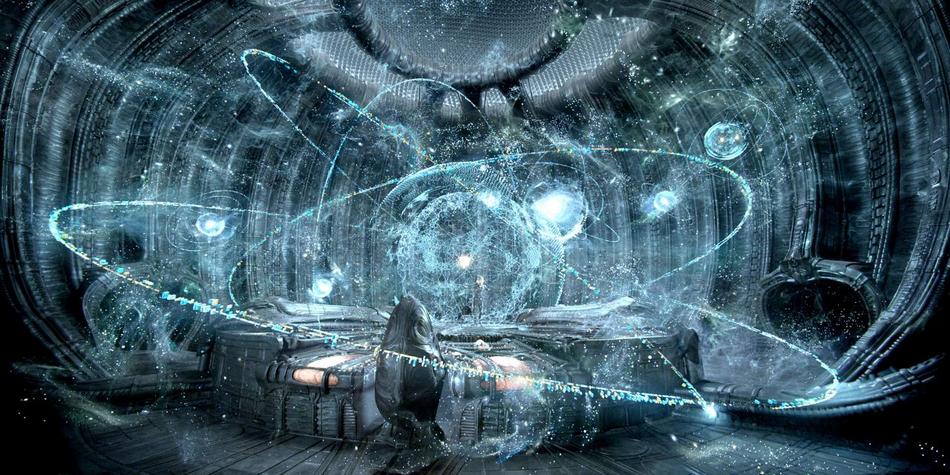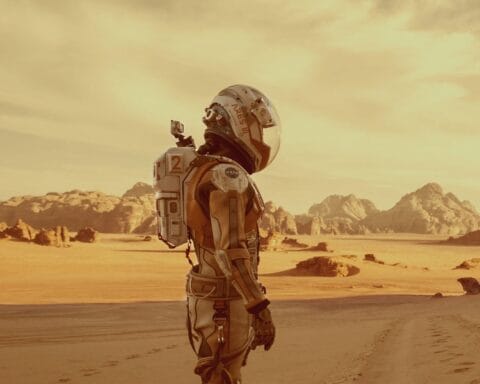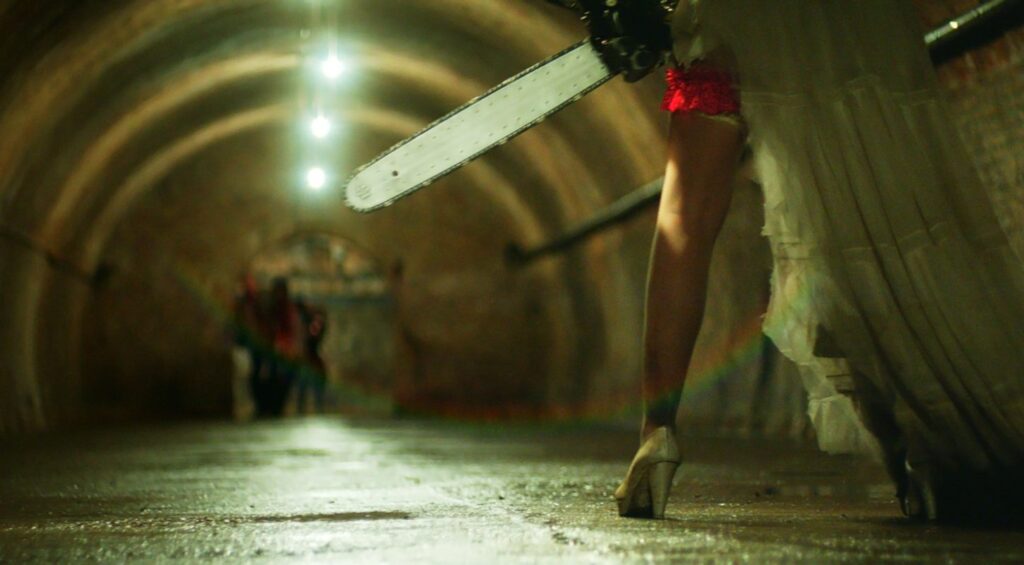In 2012, Ridley Scott made a remarkable comeback with “Prometheus,” a film that had been eagerly anticipated by fans of science fiction and the director’s work alike. The anticipation was heightened by rumors and speculations about whether the film would serve as a prequel to the iconic “Alien” saga, also directed by Scott. Despite denials from the director and screenwriter Damon Lindelof, many held onto the hope that “Prometheus” would delve into the origins of the xenomorphs and provide answers to lingering questions from the original series.
Setting aside these speculations, “Prometheus” stands as a monumental work in the realm of science fiction, offering a narrative rich in philosophical inquiry, stunning visual artistry, and a compelling examination of humanity’s quest for origins and meaning. The film distinguishes itself by intertwining themes of creation, faith, and human ambition, all while delivering a visually immersive and intellectually stimulating experience.
In this analysis, we will explore the multifaceted elements that contribute to the film’s grandeur, including its intricate screenplay, masterful direction, groundbreaking visual effects, exceptional casting, and the profound themes it explores. We will also address the controversy surrounding its connection to the “Alien” franchise and assess its place within the broader context of science fiction cinema.

II. A Complex and Intriguing Screenplay
The screenplay of “Prometheus,” crafted by Damon Lindelof and Jon Spaihts, unfolds as a rich tapestry of science fiction, mythology, and existential inquiry. The narrative is set in the late 21st century and follows the journey of a scientific expedition aboard the spaceship Prometheus to a distant moon, LV-223, in search of humanity’s creators, referred to as “Engineers.” The story is a profound exploration of humanity’s origins, purpose, and the consequences of seeking knowledge beyond our understanding.
The central characters are meticulously developed, each embodying different facets of human nature and philosophical stances:
- Elizabeth Shaw: Portrayed by Noomi Rapace, Shaw is an archaeologist driven by a deep-seated faith and an insatiable curiosity about humanity’s origins. Her character grapples with reconciling her religious beliefs with the scientific discoveries she makes, embodying the film’s central tension between faith and reason.
- Charlie Holloway: As Shaw’s partner, Holloway represents the fervent scientific zeal untempered by caution. His ambition and impatience lead to critical consequences, underscoring themes of hubris and the dangers of unchecked curiosity.
- Meredith Vickers: Charlize Theron’s Vickers is a complex figure of corporate authority and personal ambition. Her icy demeanor and strict adherence to protocol mask deeper insecurities and familial tensions, particularly concerning her father, Peter Weyland.
- David: Michael Fassbender delivers a standout performance as David, an advanced android serving aboard the Prometheus. David’s character delves into themes of creation and identity, as he seeks purpose and autonomy beyond his programming, blurring the lines between artificial and human consciousness.
- Peter Weyland: The aging founder of Weyland Corporation, played by Guy Pearce, embodies human ambition’s extreme, seeking immortality and godhood. His motivations drive much of the plot’s conflict and serve as a critique of humanity’s relentless pursuit of power and eternal life.
Supporting characters such as Ford, Chance, Fifield, Ravel, and Millburn add depth and realism to the narrative, each contributing to the unfolding drama and thematic exploration.
The screenplay adeptly balances philosophical depth with suspenseful storytelling, posing profound questions about creation, existence, and the human condition without providing easy answers. This open-ended approach invites viewers to engage intellectually and emotionally, reflecting on the broader implications of the characters’ journey and choices.
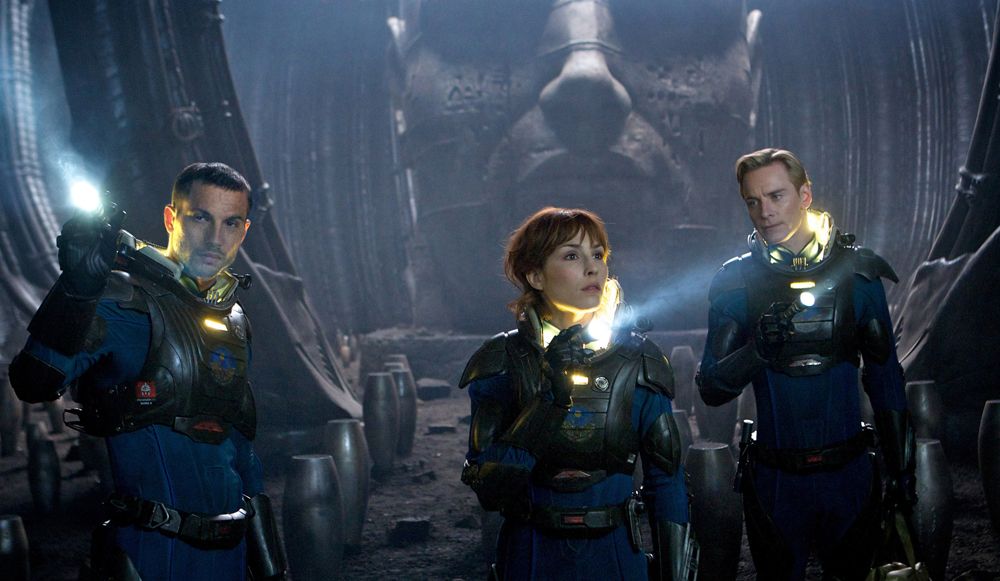
III. A Prodigious Direction
Ridley Scott’s direction in “Prometheus” is nothing short of masterful, showcasing his unparalleled ability to create immersive and visually stunning worlds. From the film’s opening sequences, Scott establishes a tone that is both majestic and foreboding, capturing the awe and terror inherent in humanity’s search for origins.
The cinematography by Dariusz Wolski enhances this vision with a palette that is simultaneously grand and intimate. The use of desaturated, cool tones creates an atmosphere of isolation and mystery, perfectly complementing the film’s thematic concerns.
Scott’s meticulous attention to detail is evident in every frame, from the expansive landscapes of Iceland, which stand in for the alien moon, to the intricate design of the spaceship and alien structures. The Prometheus itself is a marvel of design, reflecting advanced technology while maintaining a sense of realism and functionality.
The film’s pacing is expertly controlled, building tension and suspense through deliberate storytelling and well-timed reveals. Scott balances moments of intense action and horror with quieter, reflective scenes that allow for character development and thematic exploration.
One of the most striking sequences is the self-surgery scene involving Shaw, which is both viscerally horrifying and deeply symbolic. Scott handles this scene with unflinching intensity, creating a moment that is as memorable as it is unsettling.

IV. Breathtaking Visual Effects
“Prometheus” excels in its use of visual effects, seamlessly integrating CGI with practical effects to create a believable and immersive universe. The alien creatures, technology, and environments are rendered with exceptional detail and creativity, contributing significantly to the film’s impact.
The design of the Engineers is particularly noteworthy, blending human and otherworldly features to create beings that are both familiar and alien. The various life forms encountered on LV-223 are imaginative and terrifying, adding layers of danger and intrigue to the narrative.
The production design, led by Sonja Klaus, and costume design by Janty Yates, further enhance the film’s visual richness. The costumes are thoughtfully crafted to reflect the characters’ roles and personalities, while the sets and props contribute to the film’s authentic and lived-in feel.
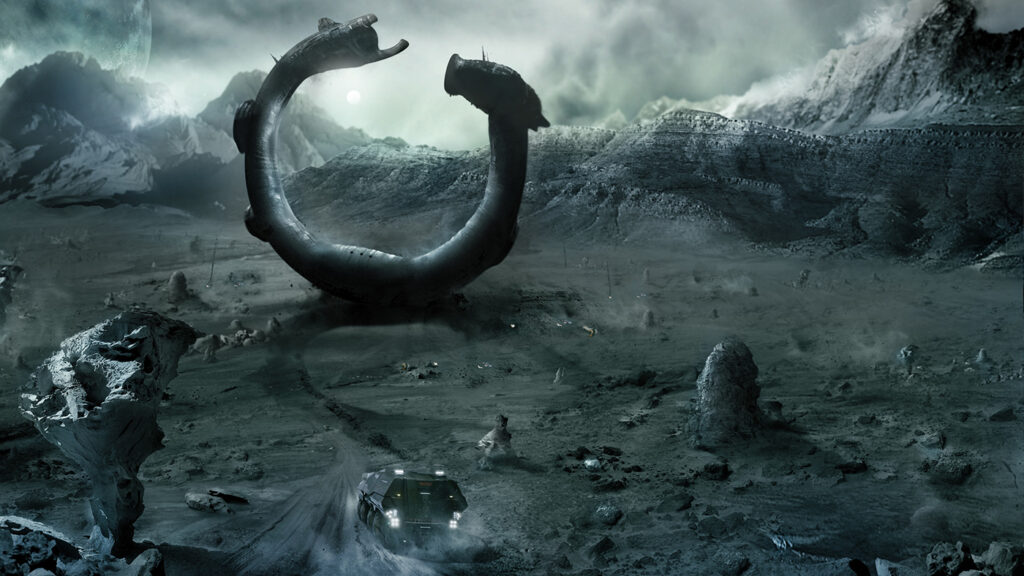
V. An Almost Perfect Cast
The ensemble cast of “Prometheus” delivers exceptional performances across the board:
- Noomi Rapace brings depth and resilience to Elizabeth Shaw, capturing her character’s vulnerability and determination with nuanced acting.
- Michael Fassbender is mesmerizing as David, portraying the android’s subtle complexity and ambiguous morality with precision and charisma.
- Charlize Theron embodies Meredith Vickers with icy control and underlying tension, adding layers to a character that could have easily been one-dimensional.
- Idris Elba as Janek brings warmth and groundedness, providing a relatable and heroic presence amid the unfolding chaos.
Supporting performances by actors such as Logan Marshall-Green, Sean Harris, and Rafe Spall contribute to the film’s realism and emotional resonance, ensuring that each character, no matter how minor, feels fully realized.
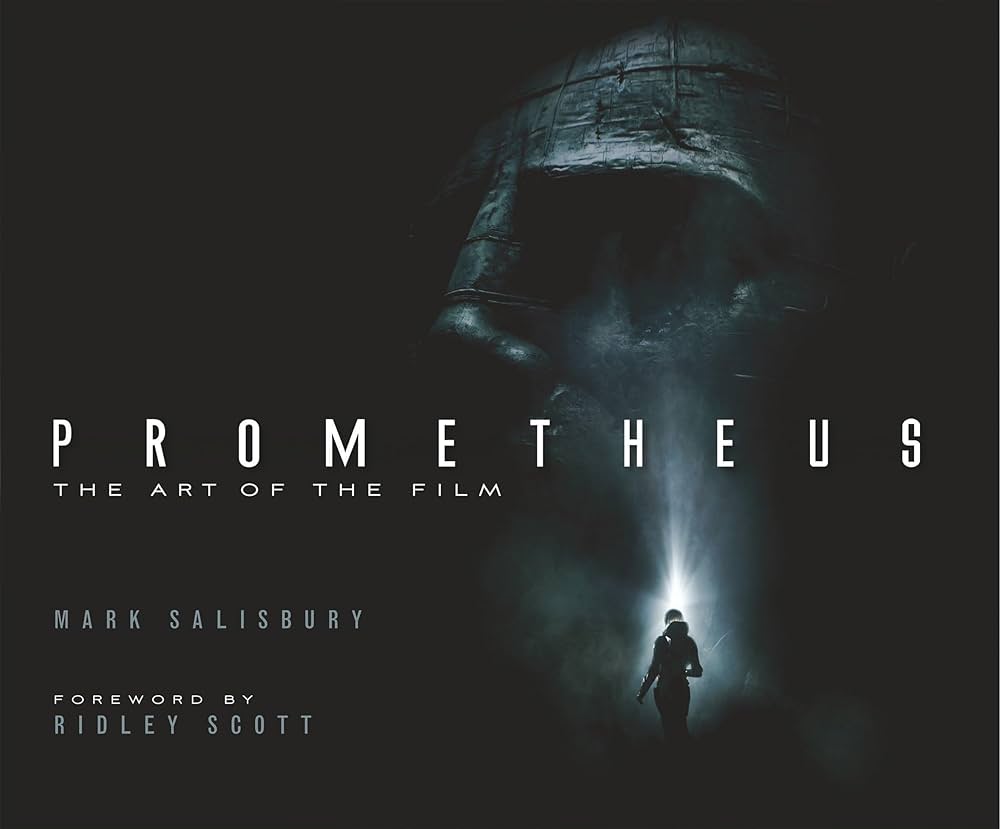
VI. Successful 3D, Interactive Marketing, and Exceptional Soundtrack
The 3D technology employed in “Prometheus” enhances the viewing experience without overshadowing the narrative. It adds depth and immersion, particularly in scenes showcasing the vastness of space and the intricate details of alien environments.
The film’s marketing campaign included an innovative website for the fictional Weyland Corporation, providing fans with interactive content that deepened engagement and expanded the film’s universe beyond the screen.
Marc Streitenfeld’s soundtrack is a vital component of the film’s atmosphere, delivering a score that is both haunting and evocative. The music underscores the film’s themes and emotions, enhancing the sense of wonder and dread that permeates the story.
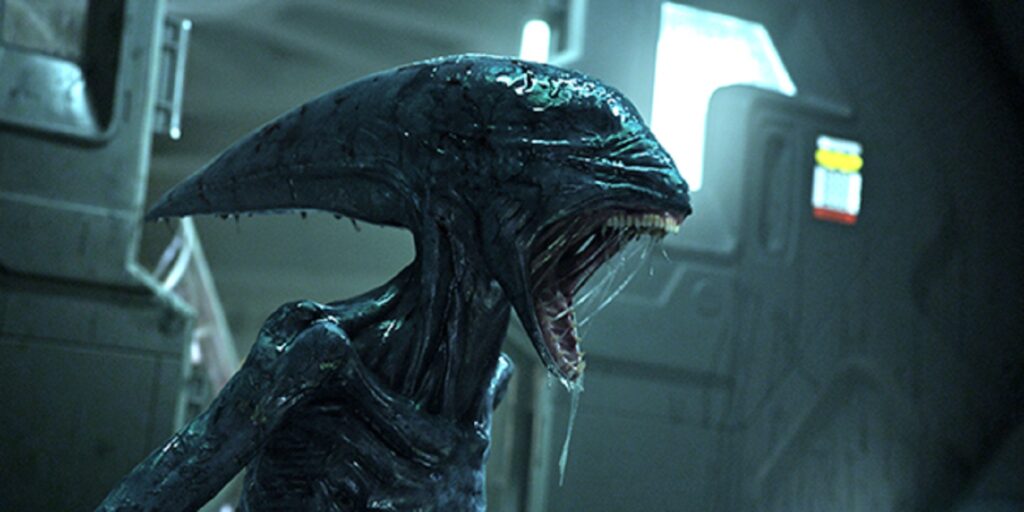
VII. The Prequel Debate
The controversy surrounding whether “Prometheus” serves as a prequel to “Alien” has been a point of contention among fans and critics. While the film shares thematic and visual elements with the “Alien” franchise, it stands on its own as a distinct narrative exploring broader questions of creation and existence. The connections to “Alien” are present but subtle, serving more as homage and thematic resonance rather than direct continuity.

VIII. Science Fiction, Mythology, Religion, and Art
“Prometheus” operates at the intersection of science fiction, mythology, and theology, engaging with age-old questions about humanity’s origins and purpose. The film draws on the myth of Prometheus, the titan who defied the gods by giving fire to humanity, symbolizing the pursuit of knowledge and the consequences that can follow.
The narrative delves into the conflict between faith and science, embodied in Shaw’s character, and examines the ethical and existential implications of creation, both divine and artificial. The presence of David as an android created by humans adds another layer, prompting reflection on the responsibilities and moral considerations of creators towards their creations.
Artistically, the film is a triumph, combining visual splendor with intellectual depth. Scott employs the medium of cinema to explore profound themes, crafting a work that is both entertaining and thought-provoking.
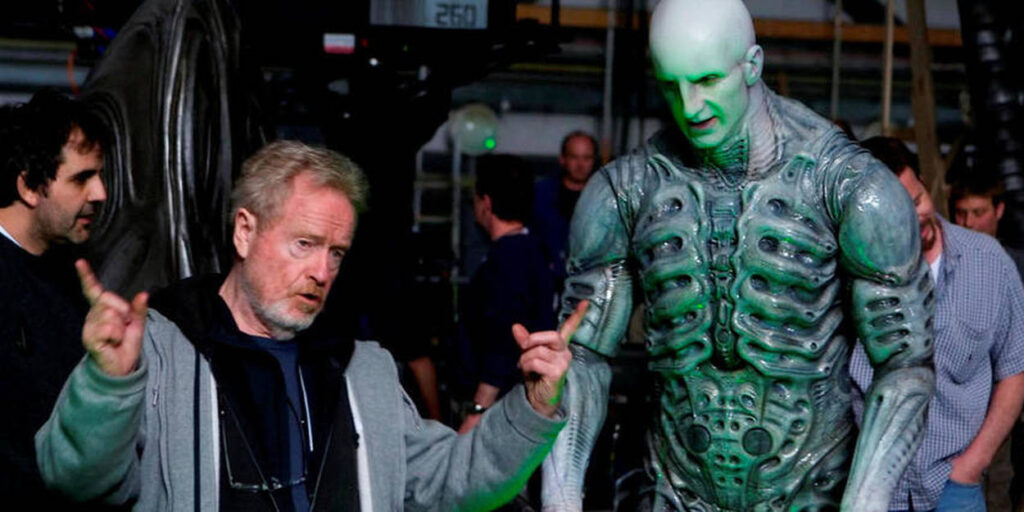
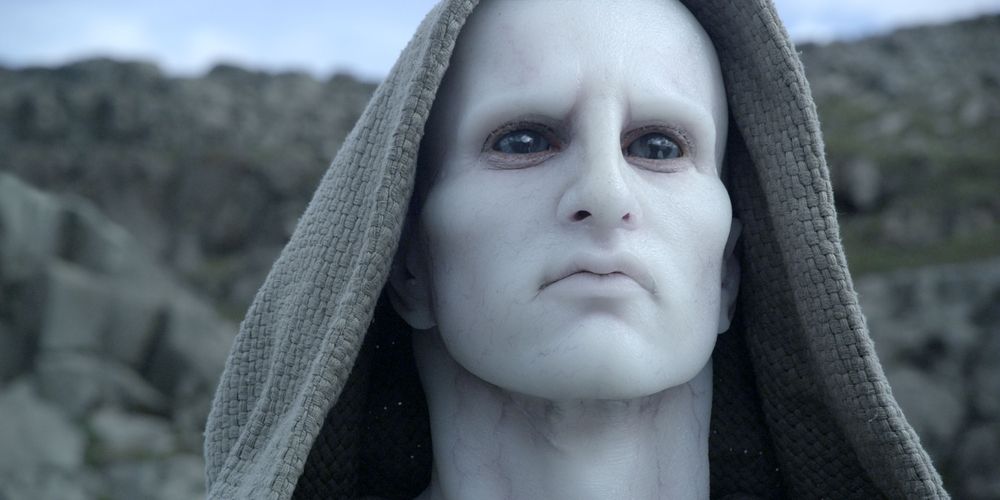

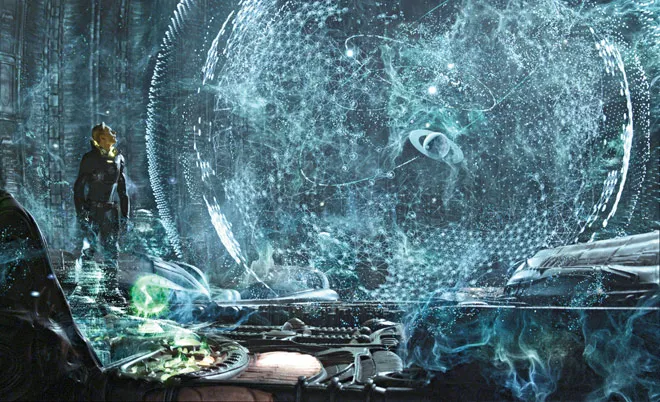
IX. Conclusion
“Prometheus” is a landmark achievement in science fiction cinema, showcasing Ridley Scott’s visionary storytelling and artistic prowess. The film offers a rich and complex narrative that challenges viewers to ponder fundamental questions about existence, creation, and humanity’s place in the universe.
With its exceptional performances, stunning visuals, and profound themes, “Prometheus” stands as a testament to the power of science fiction to explore and illuminate the deepest aspects of the human condition. It invites audiences to embark on a journey of discovery that is as intellectually stimulating as it is visually captivating.
Do not hesitate to experience this extraordinary film, which promises to engage your senses and provoke thoughtful reflection long after the credits roll.
“Oh great creator of being
Grant us one more hour,
To perform our art
And perfect our lives.”
- The Doors, “The Ghost Song”
